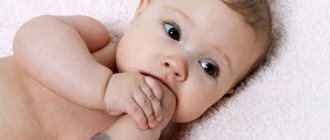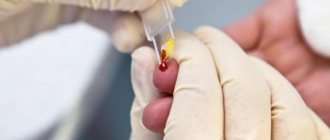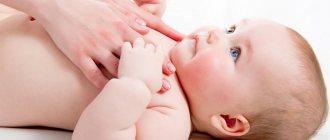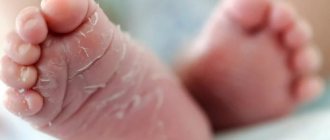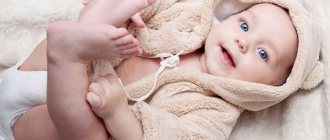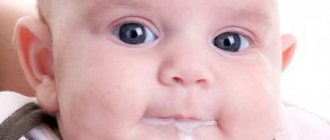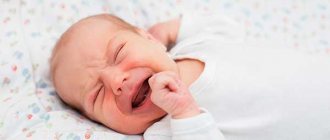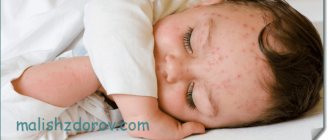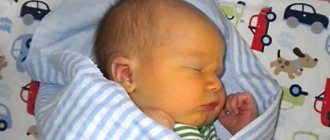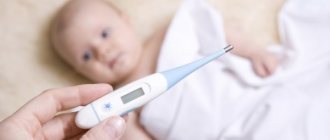Very often, after the birth of a newborn child in the house, his parents have to face various difficulties regarding his upbringing. A symptom such as a cold forehead is a normal phenomenon that many parents have to deal with. If you are concerned about this phenomenon, you need to palpate the rest of the baby’s limbs to make sure that the process of thermoregulation is not disrupted.
Very often, when parents come to see a pediatrician, they start asking the doctor ridiculous questions that evoke different feelings in him.
Is it normal to have cold sweat?
Provided the child is feeling well and there are no changes in behavior under one year old, cold sweat does not indicate a problem. Most likely it is provoked by physiological factors . It is enough to exclude them, and the symptoms will disappear.
Sometimes such changes are observed while taking certain groups of medications.
As soon as therapy is stopped, the condition returns to normal.
If after making adjustments the baby continues to sweat, a pathological process cannot be ruled out.
Cold hands and feet at high temperatures
A fairly common situation is when the baby’s arms and legs become cold and the skin turns pale due to an increase in body temperature. Why can the body react in this way to thermometer readings above 38 degrees? This is explained by the fact that blood circulation is disrupted, and it simply does not reach the extremities. In this situation, sweat begins to separate poorly and the baby’s body is not able to control the process of thermoregulation. There is an imbalance in the balance between heat transfer and heat production. In the process of heat transfer, the vessels do not expand as they should, but narrow, which is why heat does not flow to the arms and legs.
If, as the temperature rises, the limbs of the crumbs become icy, then it is not recommended to bring it down with the help of fast-acting antipyretics. The first thing to do is to warm the baby, namely his limbs.
This can be done as follows:
- intensive rubbing to obtain a warming effect,
- putting on cotton socks,
- plenty of warm drinks such as linden, raspberry, chamomile tea or cranberry juice and other compotes.
The second thing to do is relieve the spasm. However, certain antispasmodics can provoke an allergic reaction in a child, so only a doctor should determine which drug to use.
Possible reasons
The process of thermoregulation in a baby is carried out thanks to the lungs.
Provoking excessive sweating is problematic. If your baby suddenly becomes sweaty, it is important to immediately find out the reasons for such changes. They are physiological and pathological.
Physiological reasons
If your baby breaks into a cold sweat, exposure to natural factors should be excluded.
The following physiological reasons are distinguished:
- very soft, warm bed;
- high air temperature;
- excessive physical activity;
- dry air;
- incorrectly chosen clothes.
You need to ensure that the air temperature is between 18–20 degrees. It is worth remembering about regular ventilation.
It is recommended to choose a hard mattress and bedding made from natural materials.
It is important that the baby is dressed appropriately for the weather . This way it will be possible to eliminate the unpleasant symptom.
Pathological causes
Sometimes the baby sweats a lot due to the onset of the pathological process.
The following health problems can provoke the appearance of such symptoms:
- Vitamin D deficiency, which provokes the development of rickets. There is a lag in physical and mental development. Hair begins to fall out, and a bald patch appears on the back of the head. The child sleeps poorly, loses appetite;
- hyperhidrosis. Signs: excessive activity of the sweat glands; in the general form of the disease, sweat appears evenly. Local hyperhidrosis is characterized by the appearance of perspiration in certain areas of the body (palms, forehead, neck);
- pathologies of the heart and blood vessels. Increased drowsiness, weakness, lethargy are noted;
- disruptions in the activity of the endocrine system. Insufficient or excessive amounts of iodine lead to disruption of metabolic processes;
- bacterial, viral infection. The main symptom is hyperthermia. The body creates a barrier to the development and reproduction of pathogenic microorganisms and activates protective functions. Associated symptoms: sore throat, runny nose, cough;
- diseases of the nervous system. Perspiration appears in a newborn baby on certain parts of the body. The baby becomes capricious, irritable, sleep is disturbed;
- respiratory diseases (tuberculosis, pneumonia, bronchitis). There are breathing problems and a severe cough.
Symptoms of pathologies
Cold hands in a baby are not always an alarming symptom. However, parents are advised to closely monitor the general health of the baby. The sign may be the first bell that indicates the presence of developmental pathologies. It is imperative to consult your doctor if the baby additionally exhibits the following symptoms:
- constant loss of appetite;
- increased body temperature;
- the child is constantly capricious and cries;
- A severe rash is observed on the skin.
If the parents did not detect any of these negative manifestations, then cold hands only indicate that the autonomic system is at the stage of formation. After a certain period, adaptation will be completed and thermoregulation will return to normal.
However, if additional symptoms appear, you should immediately visit your pediatrician's office. He will be able to figure out why this symptom appears periodically.
Parents are not advised to wrap their child up too much. In this case, the process of its natural thermoregulation is disrupted. Because of this, the baby may become very sick in the future. Additionally, the risk of developing miliaria and diaper rash increases. A mother must determine differently whether her baby is cold. To do this, just touch your chest. The procedure should be performed with the back of your hand.
We recommend reading: Why does a baby cry?
The baby is not cold if his body is at the same temperature as your hand.
In some cases, it is possible for the breast to be slightly cool.
If it is cold, then the baby should be covered with a blanket or dressed warmer.
It is recommended to use fleece or biker shirts for this.
Within a few minutes, the baby will warm up and quickly fall asleep.
In this case, parents will not have to worry about its comfort.
Sweating at night
Parents often notice that the baby is wet from sweat at night while sleeping.
Reasons for such changes:
- the child was exposed to the sun for a long time;
- high air temperature, excessively warm clothing;
- adverse reaction caused by medications taken;
- the beginning of the development of an infectious disease;
- overweight;
- in the evening the baby overate;
- during the day, vivid impressions were received;
- fear, fright;
- runny nose.
Etiology
Sweating hands and feet in children is not a reason to panic. If the baby is a newborn, then this fact is explained by the imperfection of the thermoregulation process in the body. This is a normal phenomenon that goes away on its own with age.
This fact has a simple explanation: during intrauterine development, the body does not need to control temperature, the fetus is in the same conditions. When a child is born, he or she is faced with changes in temperature. Sweating is observed during the adaptation process.
Also, the reason why a baby’s feet are wet is the parents’ excessive care, which manifests itself in the form of a desire to provide the baby with warmth when it is not required. Mothers often wrap their children up, fearing that they will catch a cold, or create a hot climate in the house, thinking that it will be more comfortable for the baby. As a result, the child begins to sweat profusely.
Stress is also a common physiological cause of the development of hyperhidrosis. During a stressful situation, the body actively produces adrenaline, which leads to severe sweating. When experiencing stress, the first thing to sweat is your palms.
Causes of sticky sweat
Sticky sweat is observed in babies for the following reasons:
- heart disease;
- circulatory disorders;
- overactive functioning of the thyroid gland;
- taking antipyretic and painkillers;
- excessive emotionality;
- disorders of the nervous system;
- developing rickets;
- increased intracranial pressure;
- lowering sugar levels;
- low blood pressure;
- recent viral disease with complications;
- vitamin D deficiency;
- pneumonia;
- disturbance of phosphorus and potassium metabolism;
- physical exercise;
teething;- Infectious mononucleosis;
- colds, flu;
- viral gastroenteritis;
- infectious kidney diseases;
- pancreatitis;
- HIV;
- tuberculosis;
- bronchitis;
- angina.
The appearance of cold sweat on the forehead
Sometimes there is perspiration only on the head, and the baby's forehead sweats a lot.
Such changes are provoked by a number of reasons:
- overwork;
- incorrectly chosen clothes;
- non-compliance with skin care rules;
- overheat;
- eating or sucking a pacifier (this is a considerable physical activity for the baby);
- taking medications;
- excess weight;
- hereditary predisposition;
- hormonal fluctuations;
- infectious diseases;
- intrauterine infections (cytomegalovirus, toxoplasmosis, chlamydia);
- anemia;
- endocrine disorders;
- diabetes mellitus (symptoms appear at night);
- pathologies of the kidneys, liver;
- lack of vitamin D;
- heart disease;
- deviations from the central nervous system;
- rickets.
How to improve blood circulation in a newborn
In order to help quickly normalize thermoregulation in a child, you can perform some procedures. The main one of these procedures is massage. As a rule, not only the body is massaged, but also the arms and legs, and the feet are rubbed. Such manipulations have a number of positive qualities:
- normalization of body processes;
- muscle strengthening;
- improvement of well-being.
Methods for eliminating symptoms
If the problem is caused by physiological factors, to eliminate it, it is enough to follow the following recommendations:
- ventilate the room before going to bed;
- monitor the level of humidity and air temperature;
- Avoid feeding immediately before bedtime;
- carefully approach the choice of bed linen and clothing (only light, natural fabrics);
- bathe your baby daily;
- prevent conflicts and stress;
- take regular walks in the fresh air.
If excessive sweating is caused by pathological processes, you cannot do without medical help. Treatment tactics are selected after an accurate diagnosis is made.
Ways to improve thermoregulation and blood circulation in the body
You can always prevent the problem of cold feet and hands by promoting the development of metabolic processes in the baby’s body. To do this you should:
- Start tempering your toddler from a very early age. To do this, it is recommended to leave the baby lying undressed for 10-15 minutes a day. It should be dressed in loose and not tight clothes. In addition, water procedures are an excellent way to harden. In warm water, the child's body relaxes and rests. At the end of bathing, it is worth pouring water on the baby 1-2 degrees lower than the one in which he swam.
- Do gymnastics. To activate lymph flow and improve blood circulation, it is enough to do such simple exercises with your baby as cycling, bending and straightening the legs, clapping your hands and fiddling with your fingers.
- Do massage. A very effective and affordable method that any mother can master in a couple of lessons.
- Watch your diet. It must necessarily include hot dishes.
- Buy comfortable shoes. Tight shoes always mean frozen feet.
It is important to note that metabolic processes in children proceed much faster than in adults. Their bodies produce more heat, so when parents are warm, their child is likely to feel hot. This is worth remembering when dressing your child!
Pediatrician of the 2nd category, allergist-immunologist, graduated from the Belarusian State Medical University of the Federal Agency for Health and Social Development. More details », Rate this article: (1 rated 5.00 out of 5) Loading...Share with friends!
